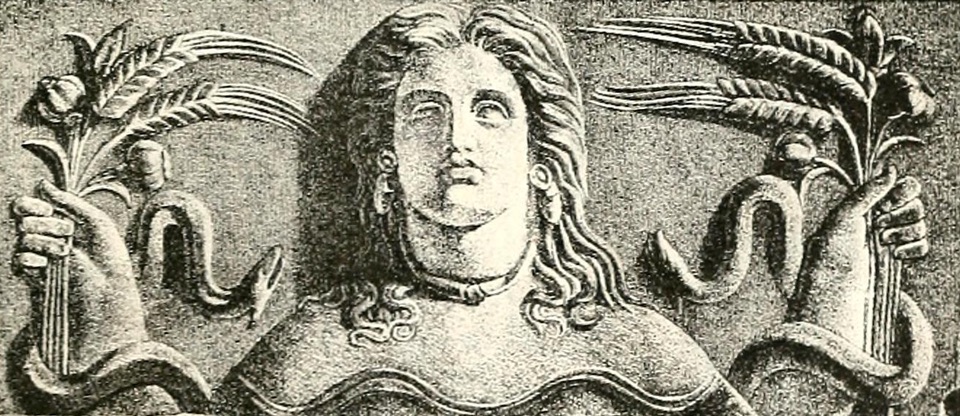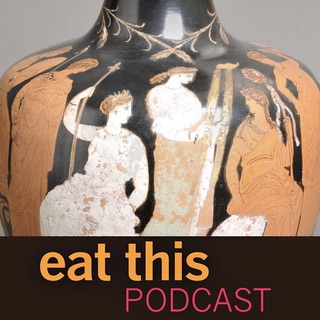
Podcast: Play in new window | Download (Duration: 8:19 — 7.7MB)
Subscribe: Google Podcasts | Spotify | Android | RSS | More
 Many people take the myth of Demeter — Ceres in Latin — and her daughter Persephone to be just a metaphor for the annual cycle of planting and harvesting. It is, but there may be more to it than that. Why else would it be worth scaring participants in the Eleusinian Mysteries into saying absolutely nothing about what went on during these initiation rites into the cult of Demeter and Persephone?
Many people take the myth of Demeter — Ceres in Latin — and her daughter Persephone to be just a metaphor for the annual cycle of planting and harvesting. It is, but there may be more to it than that. Why else would it be worth scaring participants in the Eleusinian Mysteries into saying absolutely nothing about what went on during these initiation rites into the cult of Demeter and Persephone?
Maybe the story hides a secret so valuable that it was worth protecting.
Elucidating the Eleusinian Mysteries is one small element in Scott Reynolds Nelson’s new book, Oceans of Grain. It looks at the many, many ways in which wheat and human history intertwine, which he’s been working on for years. It was finally published on 22 February this year.
Two days later, Russia invaded Ukraine.
Today, what the story of Persephone is really about. And over the next three weeks, Scott Nelson and I will be talking about how wheat has influenced human affairs, as it is still doing today.
Notes
- Banner image from The Open Court, 1900; cover image of the Eleusinian Mysteries from a water jar in Musée de Beaux-Arts de Lyon, via Google Arts & Culture.
- Yes, there is a transcript<.li>
- Next week: Grain and transport.

Jeremy Cherfas speaks with Scott Reynolds Nelson about his book Oceans of Grain. The conversations are broken up into the themes of transport, finance and empire. This series of conversations is not so much a history of wheat, but rather a history through wheat. It is fascinating to consider the impact that grain has had on so many significant historical events. I remember hearing Marilyn Lake talk about having a global perspective, this is a great example of this.
This summer, a polymath biologist @EatPodcast asked me tough q’s about Oceans of Grain
Prequel: Persephone’s secret eatthispodcast.com/grain-persepho…
1: Grain & Transport
eatthispodcast.com/transport-grai…
2: Grain & Finance
eatthispodcast.com/finance-grain/
3: Empire & Grain
eatthispodcast.com/empire-grain/
Talking of agrobiodiversity-themed podcasts1, there’s a fun dip into (some of the) history of the tomato over at Historically Thinking. Meanwhile, at Eat This Podcast, Jeremy has embarked on a monumental romp2 through the role of wheat in world history. Pizza, anyone?
Yes, we were, kinda. [↩]Yes, you can have a monumental romp. [↩]
@TimDee4 More to it than spring and autumn. Thought to be a coded guide to the long-term storage of grain, known to the Ancients and then forgotten until rediscovered in the late 18th century — without which there would be no global wheat trade. https://www.eatthispodcast.com/grain-persephone/
I’ve fallen way behind on making my listen posts public and hope to remedy the issue, particularly for the better podcasts I listen to. What better way to start than a new short series in Jeremy Cherfas’ excellent Eat This Podcast?
https://media.blubrry.com/eatthispodcast/p/mange-tout.s3.amazonaws.com/2022/transport-grain.mp3Podcast: Play in new window | Download (Duration: 30:25 — 28.0MB)Subscribe: Google Podcasts | Android | RSS | More
Cereals provide their offspring with a long-lived supply of energy to power the first growth spurt of the seed. Thousands of years ago, people discovered that they could steal some of the seeds to power their own growth, taking advantage of the storability of seeds to move the food from where it grew to where it might be eaten. Wheat, the pre-eminent cereal, moved along routes that were ancient before the Greek empire, carried, probably, by ox-drawn carts and guided along these black paths by people remembered in Ukraine today as chumaki.
In this episode, Scott Nelson, author of Oceans of Grain, tells me about the various ways in which the ability to move wheat more efficiently changed world history, geography and economics, for starters.
Notes
Scott Reynolds Nelson’s book Oceans of Grain is published by Basic Books.
Listen to Persephone’s Secret, if you haven’t already, and I promise no vengeful gods will render you dumb.
Banner photo of a grain elevator and train in Wichita Falls, Texas by Carol M. Highsmith. Image of a 19th century Chumak by Jan Nepomucen Lewicki; Public Domain.
Here is the transcript.
Huffduff it
RT: Eat This Podcast
➡️Persephone’s secret
The Eleusinian Mysteries and the making of the modern economy
#cereals #food #FoodSecurity
eatthispodcast.com/grain-persepho…
What is Persephone’s real secret. It must have been really important to threaten people at the Eleusinian Mysteries with divine revenge.
@nelsonhist explains his idea as a trailer for three episodes on Oceans of Grain
eatthispodcast.com/grain-persepho…
What is Persephone’s real secret. It must have been really important to threaten people at the Eleusinian Mysteries with divine revenge.
@nelsonhist explains his idea as a trailer for three episodes on Oceans of Grain
eatthispodcast.com/grain-persepho…
Spent 3 hours talking about how transport, finance, & empires can be understood thru grain, all with a polymath biologist @EatPodcast It should be released over the next few months. Tease is here: learn Persephone’s secret eatthispodcast.com/grain-persepho…